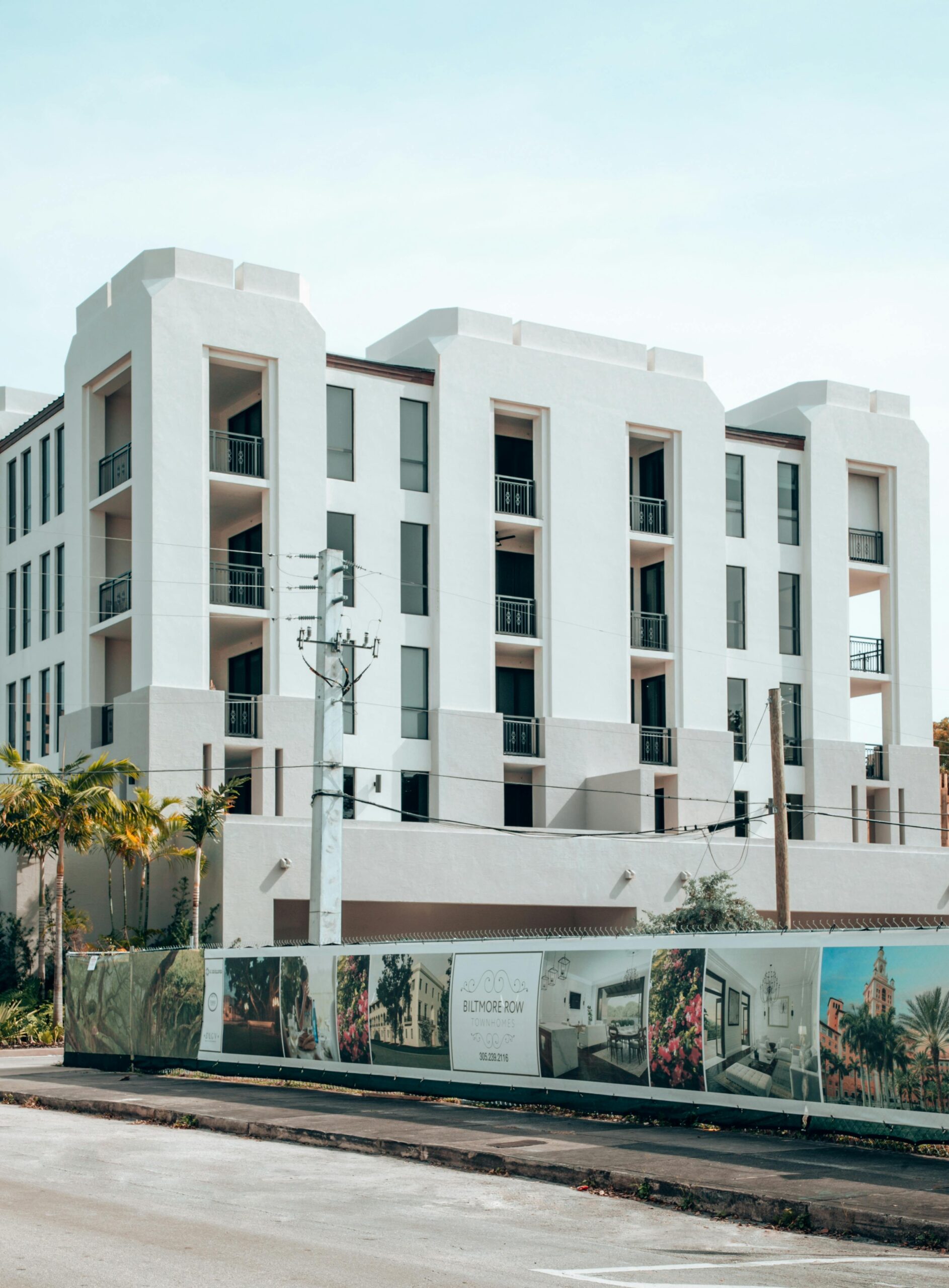As the DeSantis Condo Law continues to reshape the landscape of real estate in Florida, many potential investors find themselves asking, “What is the impact of this law on my investment?” Understanding the nuances of the DeSantis Condo Law is crucial for anyone looking to buy or manage a condo in the Sunshine State. With the new regulations aiming to enhance safety and transparency, you might be wondering how they affect property values and investor rights. Are you prepared for the changes? This law introduces significant updates that every condo owner and aspiring buyer should be aware of, from stricter building inspections to new financial disclosure requirements. If you’ve been considering investing in condo properties, you can’t afford to ignore these developments. Not only do they impact your potential returns, but they also play a critical role in the long-term viability of your investment. Dive into our comprehensive guide on the DeSantis Condo Law and discover everything you need to know to safeguard your investment and ensure compliance. Are you ready to make informed decisions in this evolving market? Don’t miss out—keep reading to unlock the secrets of successful condo investing!
Understanding the DeSantis Condo Law: Key Changes Every Florida Investor Must Know
The DeSantis Condo Law has become a hot topic among Florida real estate investors, especially those who own or are looking to buy condominiums. With Governor Ron DeSantis signing this legislation into effect, significant changes are now in place that influence how condominium associations operate and how investors engage in the market. Understanding these changes is crucial for anyone who wishes to navigate the Florida real estate landscape successfully.
What is the DeSantis Condo Law?
The DeSantis Condo Law, officially known as Senate Bill 4D, was enacted in July 2021 in response to the tragic collapse of the Champlain Towers South in Surfside. It aims to enhance building safety, increase transparency in condominium associations, and improve the overall management of condo properties. This law introduces several key requirements that condominiums must follow, and it’s vital for investors to be aware of these updates.
Key Changes Under the Law
Structural Integrity Inspections:
- Condominiums with three stories or more are now required to undergo structural integrity inspections every 10 years.
- These inspections must be conducted by licensed professionals.
- Failure to comply can result in significant fines and legal issues for the associations.
Reserve Funds:
- Condo associations must establish reserve funds for future repairs and replacements, ensuring that they are financially prepared for long-term maintenance.
- This requirement is crucial for investors, as properties with well-funded reserves are likely to be more stable and less risky.
Transparency Enhancements:
- The law mandates that associations must provide access to certain financial documents to owners and prospective buyers.
- This includes budgets, financial statements, and meeting minutes, which can help investors make more informed decisions.
Disaster Preparedness Plans:
- All condo associations must develop and implement disaster preparedness plans, particularly for hurricanes and other natural disasters common in Florida.
- This not only ensures residents’ safety but also protects your investment from damage and liability.
Insurance Requirements:
- The new law also clarifies the insurance requirements for condominiums, promoting better coverage and protection against potential losses.
- Investors should evaluate if the current policies of their associations meet these new standards.
Why This Matters to Investors
Understanding the DeSantis Condo Law is essential for current and prospective investors in Florida’s booming real estate market. Here are some reasons why these changes are significant:
- Risk Mitigation: Knowing the building safety standards can help investors avoid properties that might face structural issues.
- Financial Health: A well-managed condo association with adequate reserves indicates a lower risk of special assessments or sudden fee increases.
- Market Value: Properties that comply with the new regulations may enjoy higher market values, as buyers will be more inclined to invest in safe, well-maintained buildings.
Practical Implications for Investors
Investors should consider a few practical steps to adapt to the DeSantis Condo Law:
- Review Association Documents: Before investing, examine the condo association’s financial health and compliance with the new law.
- Engage Professionals: Consult with real estate attorneys or agents who specialize in condo investments to ensure you are making an informed decision.
- Stay Updated: Keep abreast of any future changes to the law or additional regulations that may arise.
Summary of Key Changes
Here’s a quick reference list of the key points regarding the DeSantis Condo Law:
- Structural inspections every 10 years.
- Mandatory reserve funds for maintenance.
- Enhanced transparency requirements for financial documentation.
- Disaster preparedness plans are required.
- Clarified insurance obligations for condominiums.
These changes reflect a broader effort to protect residents and investors alike, ensuring that Florida’s condominium market remains viable and attractive.
Investing in Florida condominiums can be lucrative, but it comes with its unique challenges, especially with recent legislative changes. Keeping an eye on the DeSantis Condo Law is not just advisable; it’s essential for any investor wanting to succeed in this dynamic market. Being informed helps in making strategic decisions, ultimately leading to more secure and profitable investments in the Sunshine State.
Top 5 FAQs About DeSantis Condo Law: How It Impacts Your Real Estate Investments
Navigating the complexities of real estate law can be daunting, especially when changes occur that might affect your investments. One such change is the DeSantis Condo Law, which has been a hot topic among property owners and investors in New York. Understanding this law is crucial for anyone involved in the condo market. Here’s a look at the top five frequently asked questions about the DeSantis Condo Law and how it impacts your real estate investments.
What is the DeSantis Condo Law?
The DeSantis Condo Law, officially known as the legislation enacted under Governor Ron DeSantis, was designed to reform certain aspects of condominium governance and operations in Florida. It has implications that might extend to New York, especially if you’re considering investing in out-of-state condos. The law aims to increase transparency, enhance owner rights, and improve maintenance standards.
How does the DeSantis Condo Law impact my real estate investments?
The impact can be significant if you’re an investor. Here are some key points to consider:
- Increased Transparency: The law mandates that condo associations provide detailed financial reports to owners, which can help you make more informed decisions.
- Owner Rights: It strengthens the rights of individual unit owners, giving them more say in community decisions.
- Maintenance Regulations: Higher standards for maintenance could lead to reduced long-term expenses if properties are better cared for.
Investors should be aware that these changes may affect property values. Better-managed condos often attract higher rental and resale prices.
Are there any specific requirements under the DeSantis Condo Law?
Yes, there are several requirements that condo associations must comply with. Here’s a concise list:
- Regular Financial Audits: Associations must undergo audits annually to ensure proper use of funds.
- Owner Meetings: At least two meetings per year must be held, with notice of at least 14 days given to all owners.
- Voting Procedures: Changes in rules or property management require a majority vote from owners, preventing sudden alterations without consent.
These requirements aim to create an environment of accountability and trust within condo communities.
How can I ensure compliance with the DeSantis Condo Law?
Compliance is essential if you want to avoid legal issues or financial penalties. Here’s how you can stay in line with the law:
- Stay Informed: Regularly review updates to the law and any changes in local regulations.
- Engage with Professionals: Work with a real estate attorney who understands the nuances of both New York and Florida laws.
- Attend Meetings: Participate in your condo association meetings to voice concerns and stay informed on decision-making processes.
By being proactive, you can protect your investments and ensure your rights are upheld.
What are the potential pitfalls of the DeSantis Condo Law for investors?
While the DeSantis Condo Law has many advantages, there are also potential pitfalls you need to be aware of:
- Increased Costs: Higher maintenance standards could lead to increased fees for owners, impacting your bottom line.
- Complexity of Compliance: For some, the new regulations may seem overwhelming and could lead to unintentional violations.
- Market Fluctuations: Changes in owner rights may affect investor confidence, leading to fluctuations in property values.
Understanding these pitfalls can help investors make strategic decisions and prepare for any challenges.
What resources are available for investors related to the DeSantis Condo Law?
Numerous resources can help you navigate the DeSantis Condo Law and its implications for your investments:
- Legal Professionals: Engaging a real estate attorney who specializes in condo laws can provide personalized guidance.
- Online Courses: Many organizations offer courses on condo laws and regulations that can enhance your understanding.
- Local Real Estate Groups: Networking with other investors can help you learn from their experiences and stay updated on best practices.
Using these resources wisely can empower you to make informed choices about your real estate investments.
In conclusion, the DeSantis Condo Law plays a significant role in shaping the landscape of condominium ownership and investment. Understanding its implications can help you safeguard your investments and navigate the real estate market more effectively. Whether you’re a seasoned investor or just starting, staying informed and connected with legal professionals is key to adapting to these changes successfully.
The Essential Guide to Navigating DeSantis Condo Law: Tips for Savvy Investors
Navigating the complexities of DeSantis condo law can be a daunting task for many investors in New York. This legislation, enacted to regulate condominium living and ownership, has significant implications for property owners and potential buyers alike. Understanding the nuances of this law is essential for making informed investment decisions. Here’s your essential guide to navigating DeSantis condo law, packed with tips that savvy investors should consider.
What Is DeSantis Condo Law?
DeSantis condo law governs the rules and regulations surrounding condominium ownership in New York. It was designed to protect the rights of condo owners while ensuring that developers and associations operate within a framework of accountability. This law applies to all condominiums in the state, but its provisions can vary depending on the specific circumstances of each property.
Historical Context
The DeSantis law came into play amid concerns over the rapid development of condominium complexes across New York. Many buyers were facing issues with hidden fees, unreliable builders, and inadequate maintenance services. As a response, the legislation aimed to promote transparency and fairness in condo transactions. Over the years, amendments and updates have been made, adjusting to the evolving real estate landscape.
Key Aspects of DeSantis Condo Law
Understanding the key points of DeSantis condo law is crucial for potential investors. Here are some fundamental aspects to keep in mind:
- Disclosure Requirements: Developers must provide comprehensive disclosure statements that detail the financial condition of the condo association, including budget and reserve funds.
- Voting Rights: All condo owners have the right to vote on important matters, like assessments and board member elections, ensuring that the community has a say in its governance.
- Fees and Assessments: The law mandates that all fees must be clearly outlined and justified, protecting owners from unexpected financial burdens.
- Maintenance Responsibilities: Responsibilities for maintenance and repair are defined, so owners know what they’re accountable for and what the association covers.
Tips for Savvy Investors
Investing in a condominium under the DeSantis law can be rewarding, but it also come with its own set of challenges. Here are some practical tips for navigating this landscape:
- Do Thorough Research: Before making a purchase, invest time in reviewing the condo association’s financials, rules, and regulations. Knowledge of these documents can save you from potential pitfalls.
- Consult a Real Estate Attorney: A knowledgeable attorney can offer invaluable guidance. They can help interpret complex legal language and ensure that your rights are protected.
- Engage with Current Residents: Talking to current condo owners can provide insights into living conditions and the efficacy of the condo association. They can share their experiences regarding maintenance, management, and community dynamics.
- Review the Board’s Record: Investigate the history of the condo board. Are they responsive to owners’ concerns? A well-managed board can greatly enhance your living experience.
- Understand the Resale Market: Research the resale value of condos in the area. Some buildings may have higher appreciation rates than others, which can influence your investment’s long-term viability.
Common Mistakes to Avoid
Even seasoned investors can make mistakes when navigating DeSantis condo law. Here are some common pitfalls to be aware of:
- Ignoring the Fine Print: Not reading the bylaws and rules can lead to unpleasant surprises down the line, such as restrictions on renting out your unit.
- Underestimating Fees: Failing to account for all the fees associated with condo ownership can strain your finances. Be sure to ask about maintenance fees, special assessments, and reserve contributions.
- Neglecting Building Conditions: A property that looks good on the surface might have underlying issues. Conduct a thorough inspection to uncover any potential problems.
Resources for Investors
If you’re looking to delve deeper into DeSantis condo law, consider the following resources:
- New York State Division of Housing and Community Renewal: This agency provides information on tenant rights and condo regulations, making it a valuable resource for investors.
- Local Real Estate Associations: Joining local real estate groups can offer networking opportunities and access to experienced professionals in the field.
- Legal Publications: Many legal firms publish articles and guides on condo law that can help you stay informed about changes and best practices.
Navigating the intricacies of DeSantis condo law is not just about understanding the legal jargon; it’s about making informed decisions that protect your investment and enhance your living experience. With the right knowledge and resources, investors can confidently engage in the condo market, turning potential challenges into opportunities for growth and success.
7 Important Implications of DeSantis Condo Law on Condominium Associations and Owners
The DeSantis Condo Law has made waves in the world of condominium associations and owners across Florida, and many are wondering what this means for their investments. This legislation, which aims to enhance safety and accountability in condo management, has several implications that every condominium owner and association should be aware of. Here are seven important aspects of the DeSantis Condo Law that might affect you and your property.
1. Increased Safety Regulations
One of the most significant changes under the DeSantis Condo Law is the introduction of stricter safety regulations. After the tragic Surfside collapse, lawmakers aimed to prevent similar disasters. Now, all condominium buildings are required to undergo regular safety inspections and recertifications.
- What this means for owners: Owners might see an increase in association fees to cover these inspections.
- What this means for associations: Associations are now responsible for ensuring that their buildings meet these new standards, which requires diligent management and possibly new budgets.
2. Reserve Fund Requirements
Under the new law, condominium associations are required to maintain adequate reserve funds for future repairs and maintenance. This is crucial to ensure that funds are available when major repairs are necessary, rather than relying on special assessments, which can be financially burdensome for owners.
- Reserve fund must be at least 50% of the budget for routine maintenance.
- Associations must provide owners with a detailed reserve study every 3 years.
3. Transparency in Financial Management
The law mandates greater transparency in the financial operations of condominium associations. Now, associations must provide detailed financial statements to unit owners on a regular basis.
- How this affects owners: Owners will have clearer insight into how their money is being spent and can hold associations accountable for financial mismanagement.
- Implications for associations: They will need to invest in better accounting practices and possibly hire financial experts.
4. Changes to Voting Procedures
The DeSantis Condo Law introduces new voting procedures that may affect how decisions are made within associations. For instance, electronic voting is now permitted, making it easier for owners to participate in important votes.
- Pros for owners: Increased participation could lead to more democratic decision-making.
- Challenges for associations: They must ensure that the electronic voting systems are secure and reliable to prevent fraud.
5. Enhanced Rights for Owners
The law enhances the rights of condominium owners, providing more avenues for recourse if they feel their rights are being infringed upon. This includes better protections against retaliatory actions from the board.
- Owners can now challenge board decisions more easily.
- There are now clearer guidelines for handling disputes between owners and associations.
6. Stricter Penalties for Non-Compliance
The DeSantis Condo Law also imposes stricter penalties on associations that fail to comply with the new regulations. This could range from fines to legal action taken by owners against the board.
- Impact on associations: They must be diligent in following the law to avoid financial penalties.
- Impact on owners: Owners have more power to demand accountability from their boards.
7. Impact on Property Values
With the introduction of these regulations, some experts believe that property values may increase as buyers feel safer investing in well-managed condos. However, the financial burden of compliance could also deter potential buyers if associations fail to manage budgets effectively.
- Benefits for owners: Better-maintained properties lead to increased desirability.
- Risks for associations: If financial pressures lead to mismanagement, property values could actually decline.
Final Thoughts
Navigating the implications of the DeSantis Condo Law can be complex for both condominium associations and owners. It is crucial to stay informed and understand how these changes could impact your investments and living arrangements. As the law rolls out, condominium owners should continuously engage with their associations and stay updated on any developments. Regular communication and transparency between owners and boards can ensure that everyone is on the same page, ultimately leading to a more harmonious living environment. If you find yourself uncertain about how these changes affect you, consider reaching out to a legal professional who specializes in condominium law for guidance and support.
How DeSantis Condo Law Affects Your Property Value: Insights for Future Buyers and Sellers
The real estate market in New York is always changing, and recently, the DeSantis Condo Law has stirred up quite a bit of buzz among buyers and sellers alike. This new legislation, aimed at regulating condo investments, could have significant impacts on property values and investment strategies. Understanding how this law affects you, whether you’re looking to buy or sell, is extremely crucial for making informed decisions in the competitive market.
What is the DeSantis Condo Law?
The DeSantis Condo Law is a piece of legislation passed to address various issues in the condo market, such as transparency, maintenance fees, and the overall governance of condo associations. It’s named after Governor Ron DeSantis, who has taken a strong interest in improving property ownership conditions in the state. The law introduces several important changes that potential buyers should be aware of.
- Requires condo associations to provide detailed financial disclosures.
- Mandates regular maintenance checks and transparent reporting of fees.
- Imposes stricter regulations on the use of reserve funds.
How Does This Affect Property Values?
The impact of the DeSantis Condo Law on property values can be both positive and negative. Here’s a look at some of the ways it could affect your investment:
Increased Transparency: With condo associations required to disclose financials, buyers may feel more confident investing in properties. This could potentially drive up demand and, consequently, property values.
Potential for Increased Fees: If maintenance checks reveal that a condo needs significant work, associations might raise fees to cover repair costs. This could deter potential buyers, especially if they feel that the costs outweigh the benefits.
Market Stability: By ensuring that associations manage funds properly, the law aims to create a more stable market. A stable market is often seen as more attractive to buyers, which can also enhance property values.
Insights for Future Buyers
If you’re eyeing a condo in New York, here’s what you need to keep in mind regarding the DeSantis Condo Law:
Review Financial Documents: Always ask to see the condo association’s financial statements. Look for any red flags, like high debt levels or a lack of reserve funds.
Assess the Association’s Management: A well-managed condo association can greatly influence property values. Investigate how responsive they are to maintenance issues and how they handle disputes.
Consider Future Costs: Be prepared for potential increases in fees. Understand how the law might lead to necessary repairs or improvements that could impact your monthly expenses.
Insights for Sellers
If you’re planning to sell your condo, the DeSantis Condo Law could affect your selling strategy:
Be Transparent: Disclose all necessary information about your property. A transparent approach can build trust with potential buyers and can lead to quicker sales.
Prepare for Inspections: Ensure that your property is in good condition before listing it. If maintenance issues arise during inspections, it could lead to a loss of interest from buyers.
Adjust Pricing Based on Fees: Make sure you factor in any potential increases in fees when setting your selling price. Buyers will be more cautious if they expect to pay higher fees in the future.
Practical Examples
To illustrate how the DeSantis Condo Law can play out in real life, consider these examples:
Case of a Newly Listed Condo: A condo association discloses that it has been underfunding its reserve account for years. A buyer interested in this unit may reconsider their offer, fearing future fee hikes or special assessments.
Successful Transparency: Conversely, another condo association provides clear financial reports showing strong reserves and a history of maintenance. This transparency can lead to increased buyer interest and potentially higher offers.
Fee Adjustments: If a building’s inspection reveals significant structural issues that need immediate attention, the association may need to raise fees quickly. This could scare off potential buyers who feel they might be overpaying.
Understanding the nuances of the DeSantis Condo Law is vital for navigating the condo market in New York. Whether you’re a buyer or seller, being informed about how this law impacts your property value can help you make smarter decisions. As the market continues to evolve, staying updated on legislative changes will be critical for anyone involved in real estate transactions.
Conclusion
In conclusion, the DeSantis condo law represents a significant shift in Florida’s legislative landscape, aiming to enhance the safety and sustainability of condominium living. Key provisions include stricter inspection requirements for older buildings, increased reserve fund mandates, and improved accountability for condo associations. These measures are designed to protect residents and ensure that properties are maintained to higher standards, fostering a safer environment for all. As Florida continues to grapple with the challenges of aging infrastructure, the implementation of these regulations is a vital step towards preventing future tragedies. For residents and prospective buyers alike, staying informed about these changes is crucial. Engaging with your local condo associations and understanding your rights and responsibilities can empower you to advocate for a safer living space. Together, we can ensure that Florida’s condos not only meet legal standards but also provide secure and thriving communities for everyone.



